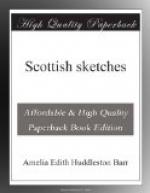“He is coming by the afternoon packet to-morrow. We must send the carriage to meet it, for Colin is bringing a stranger with him. I came to ask you if I must have the best guest-room made ready.”
“Wha for?”
“He is an English gentleman, from London, father.”
“And you would put an Englishman in the room where the twa last Stuarts slept? I’ll not hear tell o’ it. I’m not the man to lift a quarrel my fathers dropped, but I’ll hae no English body in Prince Charlie’s room. Mind that, noo! What is the man’s name?”
“Mr. George Selwyn.”
“George Selwyn! There’s nae Scotch Selwyns that I ken o’. He’ll be Saxon altogether. Put him in the East room.”
Crawford was not pleased at his son bringing any visitor. In the first place, he had important plans to discuss and carry out, and he was impatient of further delay. In the second, he was intensely jealous of Helen. Every young man was a probable suitor, and he had quite decided that Farquharson of Blair was the proper husband for her. Crawford and Blair had stood shoulder to shoulder in every national quarrel, and a marriage would put the two estates almost in a ring fence.
But he went the next day to meet the young men. He had not seen his son for three years, and the lad was an object very near and dear to his heart. He loved him tenderly as his son, he respected him highly as the future heir of Crawford and Traquare. The Crawfords were a very handsome race; he was anxious that this, their thirteenth representative, should be worthy, even physically, of his ancestors. He drew a long sigh of gratification as young Colin, with open hands, came up to him. The future laird was a noble-looking fellow, a dark, swarthy Highlandman, with glowing eyes, and a frame which promised in a few years to fill up splendidly.
His companion was singularly unlike him. Old Crawford had judged rightly. He was a pure Saxon, and showed it in his clear, fresh complexion, pale brown hair, and clear, wide-open blue eyes. But there was something about this young man which struck a deeper and wider sympathy than race—he had a heart beating for all humanity. Crawford looked at him physically only, and he decided at once, “There is no fear of Helen.” He told himself that young Farquharson was six inches taller and every way a far “prettier man.” Helen was not of this opinion. No hero is so fascinating to a woman as the man mentally and spiritually above her, and whom she must love from a distance; and if Crawford could have known how dangerous were those walks over the springy heather and through the still pine woods, Mr. Selwyn would have taken them far more frequently alone than he did.
But Crawford had other things to employ his attention at that time, and indeed the young English clergyman was far beyond his mental and spiritual horizon; he could not judge him fairly. So these young people walked and rode and sailed together, and Selwyn talked like an apostle of the wrongs that were to be righted and the poor perishing souls that were to be redeemed. The spiritual warfare in which he was enlisted had taken possession of him, and he spoke with the martial enthusiasm of a young soldier buckling on his armor.




